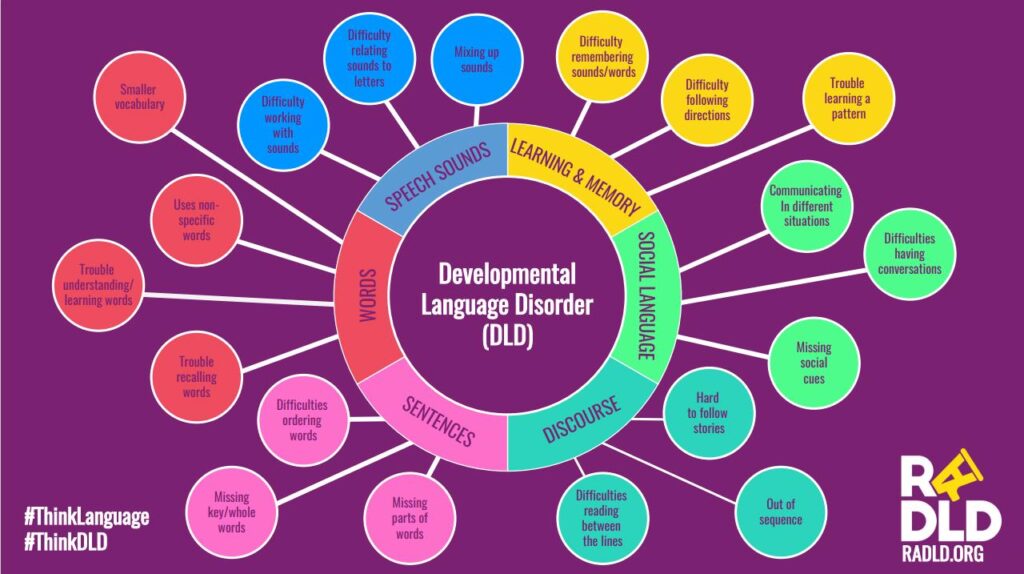On this page
Developmental Language Disorder (DLD) affects 2 in every class of 30 children. Children with DLD have significant, ongoing difficulties understanding and / or using spoken language in all of the languages they use. Children with DLD can make progress with the right support.
DLD is diagnosed by speech and language therapists.
Here Eddie and Dyls tell you more about Developmental Language Disorder:
A child with DLD may have difficulties in some of these areas:

Moor House Research & Training Institute has a useful factsheet about the signs of DLD and what to look out for if you think your child may have language difficulties
To find out more contact the Children’s Speech and Language Therapy Service.
Information for parents
DLD can affect your child’s learning at school because they learn through language. It might also affect their relationships with friends as they might find it difficult to follow and join in with conversations.
These videos give you more information if your child has been given a diagnosis and share how you can help at home.
DLD diagnosis for families
DLD strategies for families
These videos along with more information about DLD are also available on NAPLIC’s website.
Information for schools
The following information tells you about the impact of DLD on a child’s learning. It also gives you advice on supporting DLD in school.
Schools supporting students with DLD
Moor House Research & Training Institute have produced this fact sheet about key strategies for supporting children with DLD in the classroom.
The Speech and Language UK website has a comprehensive document with further information and guidance for SENCOS and class teachers:
How do Speech and Language Therapists (SLTs) work with children with DLD?
The role of the SLT is to develop children’s language abilities to their maximum potential. SLTs will teach strategies to the child and those around them to reduce the impact of their speech, language and communication difficulties on learning and social activities.
What will the Speech and Language Therapist do?
Below are some of the Speech and Language Therapist’s responsibilities:
- Identifying, assessing and diagnosing speech, language and communication difficulties
- Developing programmes of therapy to support a child with DLD
- Supporting schools to use strategies into the classroom in order to maximise children’s language skills.
- Helping teachers, parents and carers support their child’s speech, language and communication.
- Raising awareness and training professionals in identifying and working with children with DLD.
- Supporting parents with what to expect following their child’s DLD diagnosis.
- Contribute towards the child’s Education Health and Care Plan (EHCP) by submitting reports and/or attending annual review meetings where required.
- Liaising with other professionals e.g. CYPS (Children and Young Peoples Service), SENDOS (Special Education Needs and Disability Outreach Service), Educational Psychology, Occupational Therapy.
School age children
Children and young people with a DLD diagnosis receive speech and language therapy support in mainstream and specialist settings across Newcastle, including:
- Mainstream primary schools
- Mainstream secondary schools
- The two Additionally Resourced Provisions (ARPS) for children with speech and language disorders located at Welbeck Academy and Atkinson Road Primary Academy
- The Additionally Resourced Provision (ARP) outreach service for secondary pupils with DLD and an EHCP.